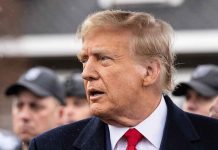
The discussion over foreign influence in Hollywood intensifies as Donald Trump proposes a 100% tariff on imported films.
Key Takeaways
- Trump announces a 100% tariff on foreign films, citing national security concerns.
- The tariffs may apply to theatrical releases but details on streaming services remain unclear.
- Commerce Secretary Lutnick supports the proposal, and the U.S. Trade Representatives are involved.
- The reaction from major studios with international productions is uncertain.
The Tariff Proposal Unveiled
Donald Trump has proposed a new 100% tariff on films produced outside the United States, labeling the presence of international productions as a national security threat. Concerns about economic incentives offered by other countries to lure filmmakers have been highlighted by Trump, who argues that these incentives are part of a concerted effort to undermine the American film industry.
The policy concept aims to enforce American cinematic protectionism, ensuring the advantage and prominence of domestic productions. Trump’s social media platform Truth Social has become a venue for these announcements as part of his effort to sway industry supporters and voters.
National Security Concerns
Trump has characterized foreign films as a national security issue due to their potential for propaganda. The president insists that the U.S. must counter these external influences by boosting its domestic film production, asserting, “WE WANT MOVIES MADE IN AMERICA, AGAIN!”
“The Movie Industry in America is DYING a very fast death. Other Countries are offering all sorts of incentives to draw our filmmakers and studios away from the United States. Hollywood, and many other areas within the U.S.A., are being devastated. This is a concerted effort by other Nations and, therefore, a National Security threat. It is, in addition to everything else, messaging and propaganda! Therefore, I am authorizing the Department of Commerce, and the United States Trade Representative, to immediately begin the process of instituting a 100% Tariff on any and all Movies coming into our Country that are produced in Foreign Lands. WE WANT MOVIES MADE IN AMERICA, AGAIN!” Trump said on Truth Social.
The proposal has seen the support of Commerce Secretary Howard Lutnick, who indicated readiness for action. The Department of Commerce and the U.S. Trade Representative are tasked with initiating the tariff process, though questions persist about its regulation and potential application to streaming services.
Industry Reactions and Implications
The proposed tariff applies to movies but excludes television productions, leaving loopholes and implications that could significantly affect U.S. buyers if reciprocal tariffs follow. Studios with global operations such as Disney, Sony, and Universal could face challenges adapting to these changes.
The tariffs risk conflict with ongoing World Trade Organization policies and existing sectors of the U.S. economy, which maintain a positive trade balance from movie exports. China’s previous response to U.S. tariffs—reducing imported U.S. films—provides a precedent for potential international repercussions.





